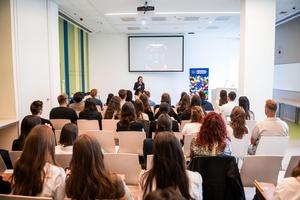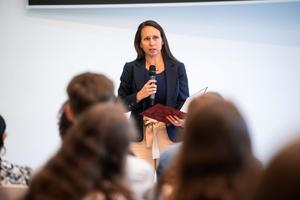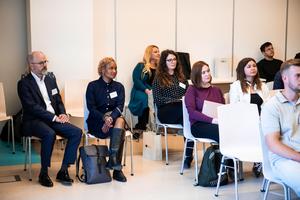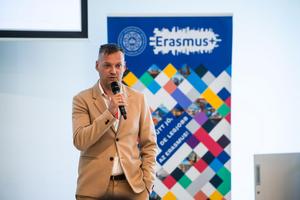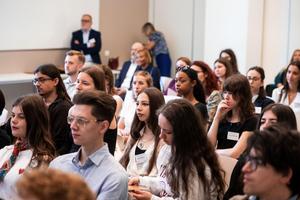The International Division of the Faculty of Public Governance and International Studies (FPGIS) at Ludovika University of Public Service (LUPS) organized an event titled "Cybersecurity in Public Service" as part of the Erasmus+ Blended Intensive Program (BIP). The event was officially opened on May 26 at the university’s Orczy Road Dormitory.
In her welcome speech, Réka Varga, Dean of LUPS FPGIS, highlighted that BIP is a unique, short-term, intensive initiative combining physical and virtual mobility programs, implemented through the cooperation of three higher education institutions: LUPS, Inholland University, and the Faculty of Law of Josip Juraj Strossmayer University of Osijek. “It is a particular honor for me that this year, 45 international students are participating in the program,” added Réka Varga. She emphasized that cybersecurity in public service is a timely topic with increasing global significance. She stated that the aim of the current event is to provide an in-depth overview of fundamental cybersecurity concepts, exploring not only technical aspects but also legal, ethical, and political implications. Varga declared that the program explores areas of cyber threats and the development of the emerging information security profession, adding that cybersecurity is not merely a technical issue, but one of national security, public trust, and democratic resilience — especially concerning public institutions.
Péter Krisztián Zachar, Vice-Dean for International Affairs of LUPS FPGIS, also greeted the participants. In his speech, he first gave a brief historical overview of the university, highlighting its roots in the 19th century and its re-establishment in 2012. “LUPS aims to be an international hub encompassing military, diplomatic, water management, and teacher training,” the Vice-Dean emphasized. He underlined the university’s prominent role in international cooperation, offering comprehensive courses and promoting collaboration among international scholars and students. Speaking about the FPGIS, he pointed to its broad research and educational portfolio, including administrative law, international law, cybersecurity, and digital media. He encouraged participants to consider pursuing further studies at Ludovika.
Csaba Krasznay, Associate Professor at the Department of Cybersecurity at FPGIS, recalled in his lecture that he has 20 years of experience in the field of cybersecurity. He reflected on what motivated him to research cyber defense and his involvement in drafting Hungary's first information security law. He noted that the challenges of cybersecurity came into sharp focus in Hungary around 2018–2019. During the COVID pandemic, everyone began using social media, and cyberspace became the primary arena for personal relationships and work. “By 2025, cybersecurity is already one of the main issues in international politics,” the expert emphasized. He also stressed the challenges of digital autonomy and data security, particularly concerning the reliance on technologies from outside the EU and the migration of European engineers to U.S.-based companies.
Krasznay expressed concern that Europe lacks a digital ecosystem. While acknowledging the internet as an important “invention,” he stressed the importance of its safe use, adding that widespread internet usage without proper education increases vulnerability to fraud — especially among the elderly. He also noted that cyberspace has been used for military operations since the outbreak of the Russia-Ukraine war in 2022, highlighting the spread of disinformation. He also spoke about artificial intelligence as a technology that he believes introduces further new risks.
Between May 26–30, other renowned international and Hungarian experts will speak on the subject, followed by online lectures from June 2–5.
Text: Éva Harangozó
Photo: Dénes Szilágyi
